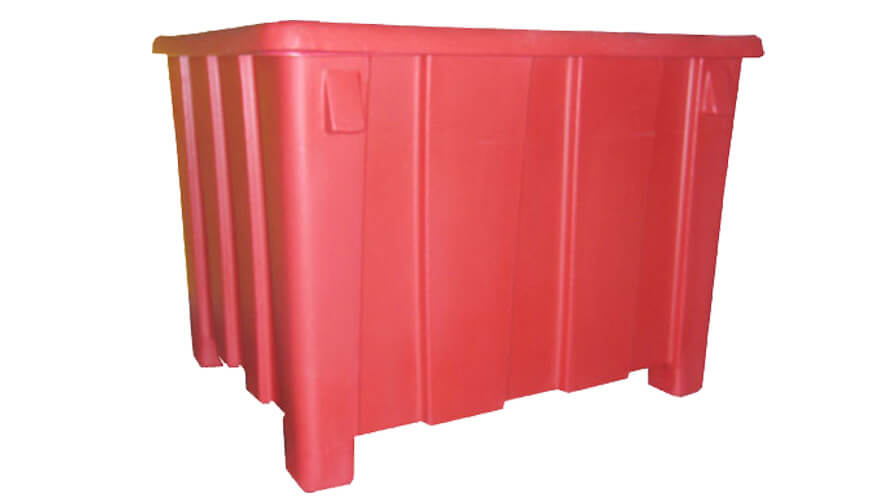The Duty of Bulk Plastic Containers in Effective Recycling Practices and Sustainability
Bulk plastic containers are essential to contemporary recycling initiatives. Their layout boosts the efficiency of product collection and transport, adding to sustainability goals. These containers not just enhance area yet likewise help in monitoring contamination levels. Their execution is not without difficulties. Comprehending the full extent of their impact reveals a complex partnership in between logistics and environmental responsibility that calls for additional exploration.
Comprehending Mass Plastic Containers
Mass plastic containers act as an essential part in different markets, promoting the storage and transportation of goods. These containers are typically made from robust products such as high-density polyethylene (HDPE) or polypropylene, which provide toughness and resistance to environmental aspects. Their design usually consists of functions like stackability and modularity, permitting effective use area throughout both storage and transit.
Industries such as agriculture, food handling, and making regularly use mass plastic containers because of their light-weight nature and simplicity of handling. The containers come in numerous sizes and arrangements, accommodating the certain requirements of various items. Their versatility extends beyond mere functionality; they can additionally be customized with covers, handles, and classifying choices to enhance functionality - bulk plastic containers for sale. Consequently, bulk plastic containers play an important function in enhancing logistics and supply chain operations across numerous fields, therefore contributing to total effectiveness and cost-effectiveness
Benefits of Making Use Of Bulk Plastic Containers in Recycling
When organizations focus on reusing efforts, the usage of bulk plastic containers considerably enhances the efficiency of the process. These containers are developed to enhance area, enabling for the storage and transportation of bigger quantities of recyclable products. This results in less journeys to recycling centers, therefore lowering fuel intake and connected exhausts.
Additionally, mass plastic containers are durable and resistant to numerous environmental elements, making certain that products stay safeguarded during handling and transportation. Their light-weight style additionally adds to reduce transportation expenses.
In addition, the uniformity of these containers facilitates much better sorting and handling of recyclable materials, which can boost total recycling prices - bulk plastic containers for sale. Organizations that adopt bulk plastic containers additionally show a dedication to sustainability, positively affecting their brand name photo. Eventually, these advantages not only streamline reusing methods but additionally add to wider environmental objectives
Exactly How Bulk Plastic Containers Facilitate Material Collection
Reliable material collection is significantly boosted by the use of mass plastic containers, as they offer a organized and effective service for collecting recyclable items. These containers are made to suit large quantities of products, which simplifies the sorting and storage space process. Their stackable design optimizes room application, making it much easier for centers to arrange recyclables without mess.
On top of that, bulk plastic containers are long lasting and weather-resistant, permitting exterior positioning without destruction. This resilience ensures that products continue to be safeguarded till they are collected for handling.

The uniformity in shapes and size of these containers assists in standardization throughout collection points, enabling better monitoring of recyclable quantities. Moreover, their clear nature enables for very easy visibility of contents, assisting in the monitoring of contamination degrees and ensuring that only suitable products are collected. In general, mass plastic containers play an important function in streamlining the product collection procedure, therefore advertising effective recycling techniques.
Transport Performance and Environmental Impact
Transport effectiveness plays a crucial role in the reusing procedure, especially via the optimization of tons capacity wholesale plastic containers. By optimizing the volume of product transported, companies can greatly reduce the number of journeys needed, thus minimizing their carbon impact. This technique not just boosts operational efficiency but additionally contributes to a lot more sustainable ecological techniques.

Optimizing Lots Capacity
Although enhancing load capability is usually overlooked, it plays a necessary role in improving transport performance and reducing environmental influence in reusing techniques. By optimizing the quantity that bulk plastic containers can hold, reusing operations can reduce the variety of trips required for transportation. This not just decreases gas intake but likewise lowers the deterioration on automobiles. Effective lots administration enables centers to make use of space efficiently, making certain that each transport cycle is as efficient as feasible. Furthermore, well-optimized lots can cause far better settlements with logistics carriers, possibly decreasing total prices. Inevitably, boosting load capability adds to an extra sustainable reusing system by fostering reliable resource use and reducing waste created throughout transportation.
Lowering Carbon Footprint
As recycling procedures venture to reduce their environmental effect, decreasing the carbon impact related to transportation arises as a crucial goal. Bulk plastic containers play an important duty in accomplishing this goal by improving tons efficiency and enhancing logistics. Their light-weight yet sturdy layout enables optimum cargo space application, reducing the variety of trips required to move materials. By combining shipments, recycling facilities can decrease fuel consumption and greenhouse gas emissions. On top of that, purposefully finding recycling facilities reduces transportation distances, in addition lowering carbon results. Additionally, utilizing fuel-efficient lorries and different energy resources boosts general sustainability. By incorporating these techniques, the reusing market can appreciably decrease its carbon impact, contributing to a much more sustainable future.
Challenges in the Use of Mass Plastic Containers

Contamination Concerns
Contamination issues represent a considerable obstacle in the effective use of bulk plastic containers within reusing practices. These containers usually collect deposits from previous contents, causing blended products that can hinder the recycling process. Impurities such as food waste, chemicals, or non-recyclable products can compromise the honesty of the whole set, causing increased disposal prices and reduced reusing prices. Furthermore, improper cleaning or sorting can worsen these concerns, making it difficult for recycling facilities to refine products effectively. The visibility of contaminants not just affects the top quality of recycled products yet likewise undermines the total sustainability efforts aimed at decreasing plastic waste. Attending to these contamination obstacles is crucial for boosting the efficiency of bulk plastic container recycling.
Recycling Infrastructure Limitations
Inadequacy in reusing infrastructure postures substantial obstacles for the reliable administration of mass plastic containers. Lots of recycling centers lack the capability to process large volumes of these containers effectively, resulting in raised costs and hold-ups. Inadequate sorting technologies commonly lead to contamination, as mass containers may be mixed with various other materials, making complex the reusing procedure. Restricted transport choices also impede the movement of mass plastic containers to appropriate reusing centers, leading to boosted land fill waste. Additionally, an absence of standard protocols for mass container recycling develops complication among customers and services, better making complex initiatives to advertise sustainability. Dealing with these facilities constraints is necessary to boost recycling methods and make best use of the capacity of mass plastic containers in a circular economic situation.
Finest Practices for Executing Mass Plastic Containers
When organizations take into consideration applying mass plastic containers in their recycling practices, they need to focus on a critical method that enhances performance and decreases contamination risks. First, picking the appropriate container dimension and kind is vital to accommodate the quantity of materials being refined. Organizations must likewise establish clear labeling and signage to guide individuals on proper disposal methods, decreasing confusion and errors. Regular training sessions for team can better strengthen these methods, making certain everyone understands their roles in keeping recycling honesty.
In addition, companies should apply a routine upkeep timetable to evaluate and tidy containers, protecting against the accumulation of contaminants. Partnering with local recycling facilities can additionally simplify the collection procedure, making sure that products are successfully processed. Ultimately, organizations ought to monitor and evaluate their reusing metrics, using this data to refine practices gradually and promote continuous renovation in their sustainability initiatives.
The Future of Mass Plastic Containers in Lasting Practices
As companies increasingly prioritize sustainability, the duty of mass plastic containers in reusing methods is set to evolve substantially. Innovations in products scientific research are bring about the growth of recyclable and biodegradable options, improving the environmental advantages of mass plastic containers. In enhancement, the application of closed-loop systems will certainly permit easier collection and repurposing of these containers, reducing waste and source consumption.
Technological advancements, such as wise tracking systems, will make it possible for companies to check the lifecycle of mass containers, improving effectiveness in reusing processes. As customer need for lasting click here for more practices grows, businesses will likely take on mass plastic containers created for reuse and long-term value. Collaboration between governments and markets will certainly cultivate the facility of standard reusing procedures, making sure that bulk containers are efficiently incorporated into broader sustainability campaigns. Overall, the future of mass plastic containers appears encouraging, with significant capacity for contributing to a round economic situation.
Frequently Asked Inquiries
Exactly How Are Bulk Plastic Containers Made and What Products Are Utilized?
Bulk plastic containers are commonly made from high-density polyethylene (HDPE) or polypropylene (PP) These products are processed through shot molding or strike molding techniques, resulting in long lasting, lightweight containers appropriate for different storage space and transportation needs.
Can Mass Plastic Containers Be Recycled Several Times Prior To Recycling?
Yes, bulk plastic containers can be reused numerous times prior to reusing. Their longevity and layout enable for duplicated use in numerous applications, advertising sustainability and resource efficiency while reducing the demand for brand-new containers.

What Qualifications Exist for Mass Plastic Containers in Recycling?
Different qualifications for mass plastic containers consist of the Recycling Collaboration's certification, the Cradle to Cradle Certified ™ standard, and the Sustainable Product read the article packaging Union's guidelines, guaranteeing containers meet details environmental and recyclability criteria for efficient recycling.
Exactly How Do Mass Plastic Containers Compare to Other Recycling Storage Options?
Mass plastic containers offer greater resilience and ability contrasted to other recycling storage choices, minimizing the risk of contamination and promoting effective transportation. Their style sustains better company, boosting total performance in reusing operations.
What Is the Life expectancy of a Bulk Plastic Container in Recycling Processes?
The life-span of a mass plastic container in recycling procedures generally varies from 5 to one decade, depending on use, worldly top quality, and ecological conditions, permitting numerous cycles of use before eventual disposal or recycling.
When companies focus on recycling efforts, the application of bulk plastic containers significantly improves the performance of the process. Transportation performance plays a vital function in the recycling procedure, especially with the optimization of load capacity in bulk plastic containers. The use of mass plastic containers in recycling practices deals with considerable obstacles, particularly worrying contamination problems and restrictions within recycling facilities. Contamination concerns stand for a substantial challenge in the reliable use of bulk plastic containers within reusing methods. When organizations consider carrying out mass plastic containers in their recycling methods, they need to focus on a critical approach that improves effectiveness and lowers contamination risks.